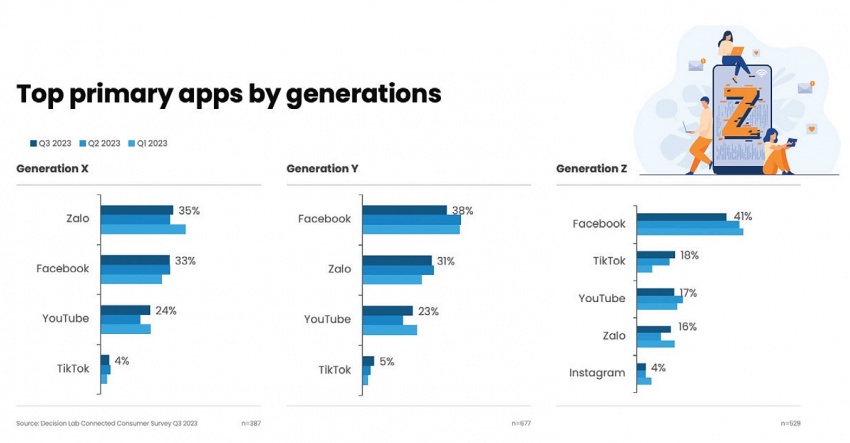Gen-Z saying “meh” to social media
 |
| Gen-Z saying “meh” to social media |
Three weeks ago, a lavish launch ceremony for Vdiarybook took place at My Dinh National Stadium in Hanoi with the participation of thousands of people. Interestingly, the majority of attendees were from so-called Gen X and Gen Y, with an average age of about 30-50 years old.
Vdiarybook is a Vietnamese social network. Although it operates similarly to other social networks on the market, Vdiarybook does not focus on entertainment or trends that serve the interests of young individuals, but prioritises sharing information on traditional culture and history.
“We want to create an official and useful information environment. Vdiarybook does not serve the masses but seeks more sustainable value,” said Le Trung Hieu, director of Vzone Global Technology Group, the unit that developed Vdiarybook.
Vdiarybook’s differences mean that patience may be required for it to succeed. Thus far, the social network has fewer than 100 active accounts and few interactions from members. Hieu said that a number of features are still in active development.
The history of Vietnamese social media efforts point to an uphill struggle for Vdiarybook. Many Vietnamese social networks have appeared and quickly failed because they could not compete with bigger names.
In 2019, Gapo and Lotus both held grand launches and confidently challenged successful social networks such as Facebook, YouTube, and Instagram. Lotus aimed to become an all-in-one social network, providing news and entertainment and connecting key opinion leaders with fans with promises of bringing income to users through tokens.
Meanwhile, Gapo had the ambition to create a separate social network for Vietnamese people after announcing investment of $21 million from G-Capital fund. The social network aimed to reach 50 million users by the end of 2022. Only three months after launch, both Lotus and Gapo sank into oblivion.
According to the Connected Consumer 2023 report for the third quarter of 2023 published by Decision Lab, a digital media company specialising in market research in Vietnam, Vietnam’s Gen Z (typically people born in 1997-2012) is showing a trend of unplugging from social media.
About 75 per cent of Gen Z want to quit at least one social media platform, and their wish to disconnect suggests a need to regain control over their time and mental space from the networks they have so heavily populated, the report said.
However, the report also emphasises that disengaging from social media is challenging as it has become such an integral part of daily life.
On average, individuals claim they cannot live without at least two social media apps. They are also quick to adopt new platforms, with 4.9 per cent of Gen Z people using Threads, Meta’s new platform. This number doubles with Gen Y (people typically born 1981-1996) and even triples with Gen X (1965-1980).
“I will quit social networks,” said Thao Chibi, an employee of a technology company in Hanoi after she stopped using the phone to surf the internet during her spare time for a week. She decided to delete Facebook and TikTok but still uses other entertainment and newspaper apps and keeps in touch with relatives.
“I’m used to spending hours surfing social networks, participating in debates about things that don’t matter, and always being afraid of missing out,” Chibi said.
Attacks in the cyber environment and malicious information that is not strictly verified have also made more people realise that social networks have invisible effects on their physical and mental health. Therefore, some are gradually thinking about limiting their online time or leaving them altogether.
“I was shocked when I realised the time I wasted surfing social networks over the years,” said Habe, a 24-year-old from Hanoi. “When I deleted Facebook and Instagram in 2022, I spent time reading books, being with my family, or cooking.”
Dr. Bui Nguyen Hong Bao Ngoc, deputy head of Substance Use and Behavioural Medicine at the Institute of Mental Health under Bach Mai Hospital said, “Internet and social network addiction can cause mental disorders such as depression, anxiety, and stress. At the same time, it reduces social interaction, causing insomnia and sleep disorders, and affecting academic and work performance.”
The Ministry of Information and Communications says that Vietnam currently has over 930 domestic social media platforms with some 130 million registered accounts. However, social networks in Vietnam all face losses and cannot exploit business or advertising. Most social networks are not used regularly, and do not generate revenue or profit.
Meanwhile, Facebook (70 million accounts), YouTube (60 million accounts), and TikTok (45 million accounts) account for 70 per cent of the online advertising market share in Vietnam, bringing in more than $1 billion in revenue.
 | Gen Z – the breakthrough generation or the disruptors? At the recent launch of the Top 50 Best Employers of Choice by Vietnam Students 2020, Anphabe provided exclusive talent insights into Gen Z, the next generation of workers. |
 | Gen Z demand flexible, digital-led work environment People under 25 are more likely to change their jobs, have higher expectations of their employers, and demand more flexibility, according to recent surveys. |
What the stars mean:
★ Poor ★ ★ Promising ★★★ Good ★★★★ Very good ★★★★★ Exceptional
Related Contents
Latest News
More News
- Masan Consumer names new deputy CEO to drive foods and beverages growth (February 23, 2026 | 20:52)
- Myriad risks ahead, but ones Vietnam can confront (February 20, 2026 | 15:02)
- Vietnam making the leap into AI and semiconductors (February 20, 2026 | 09:37)
- Funding must be activated for semiconductor success (February 20, 2026 | 09:20)
- Resilience as new benchmark for smarter infrastructure (February 19, 2026 | 20:35)
- A golden time to shine within ASEAN (February 19, 2026 | 20:22)
- Vietnam’s pivotal year for advancing sustainability (February 19, 2026 | 08:44)
- Strengthening the core role of industry and trade (February 19, 2026 | 08:35)
- Future orientations for healthcare improvements (February 19, 2026 | 08:29)
- Infrastructure orientations suitable for a new chapter (February 19, 2026 | 08:15)

 Tag:
Tag:




















 Mobile Version
Mobile Version